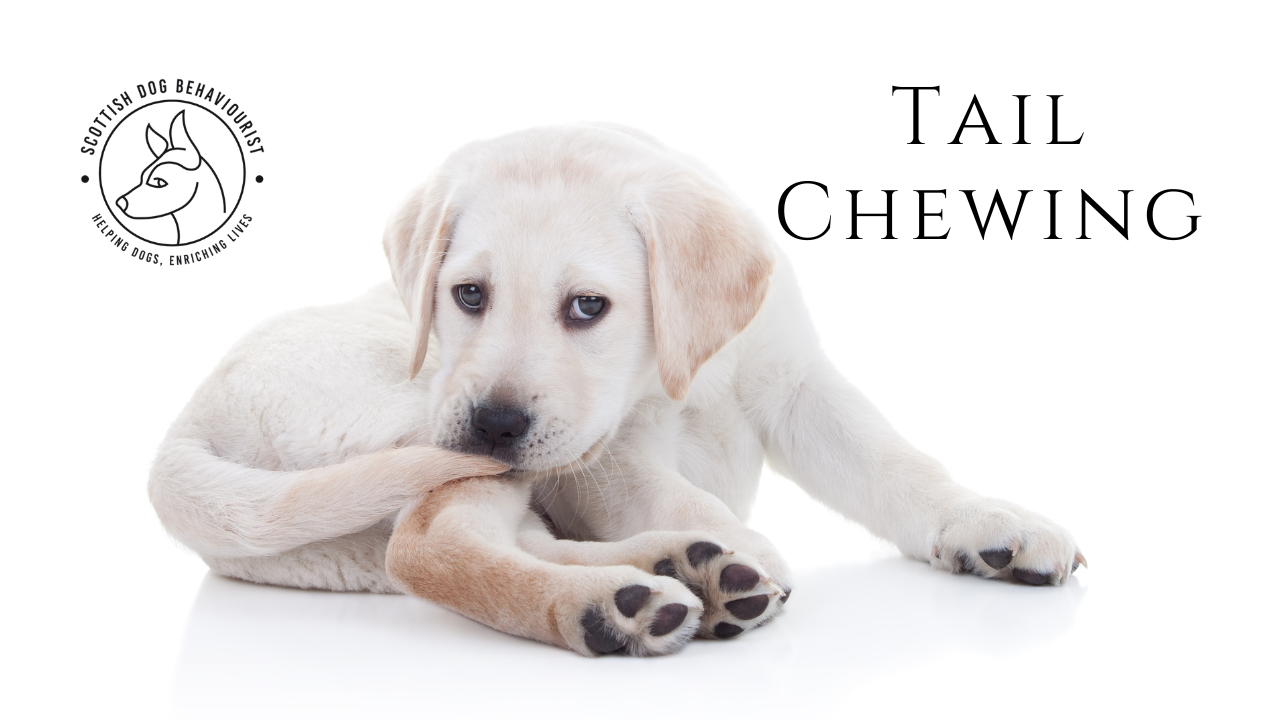Why Do Dogs Chew Their Tails?
Aug 17, 2023
Tail Chewing
Why Do Dogs Chew Their Tails?
Running in dizzying circles, trying to grab the tip of their tail can look like so much fun. So much so that you grab your phone to capture a cute moment for a chuckle later on or to clip for your socials.
Did you ever stopped to wonder why dogs exhibit this behaviour?
This has popped up twice in this past week, so I thought I’d write a wee blog on the reasons behind this sometimes amusing and often worrying dog behaviour.
Before we jump into the behavioural reasons for this it’s IMPORTANT that if you have concerns with your dog exhibiting this behaviour that you should start with a consultation with your vet to rule out potential physical issue.
Check with your vet!
Dogs can't verbalise their discomfort to us, try to understand that behaviour is their language.
If a dog is chewing its tail, the underlying physical causes of this could be allergies, parasites, fungal infections, or even and injury that’s hard to spot.
Make sure there are no physical issues first before looking at behavioural causes.
Behavioural Causes
Now we can have a look at some behavioural explanations for this.
Boredom and Lack of Stimulation
If your dog is left without much to do, doesn’t get enough mental stimulation from walks, if left for too long alone or in a separate room from you it could resort to tail-chewing as a form of self-entertainment.
An under-stimulated dog will find ways to amuse itself, and sometimes if it takes their fancy, that could means focusing on its tail.
Anxiety and Stress
Dogs are sensitive animals, any drastic change in their environment, loud unexpected noises, or prolonged separation from their loved ones can induce anxiety.
Dogs may resort to behaviours like tail-chewing, similar to humans biting their nails when nervous.
Compulsive Behaviour
This may have started as a reaction to a stimulus, this could become a compulsive behaviour even long after the original cause has ceased.
This is similar to obsessive-compulsive behaviours observed in humans.
Attention Seeking
As you as dog owners are by now well aware, dogs are great at understanding human reactions and emotions. If they notice that tail-chewing earns them attention (even if it's you telling them to stop), they might continue doing it to keep that attention going.
Scents and Tail Chewing
When out walking your dog, especially in parks, woods, or even just your neighbourhood where there are lots of scents and smells its tail (depending on its size of course) can pick up various scents from the ground, plants, other animals, etc. Here’s a few reasons to show how given the right circumstances, this could be the cause.
New Scents
Dogs explore the world predominantly through their noses. If their tail picks up a smell they find interesting they might chew or bite at it out of curiosity.
Distaste or Irritation
Dogs like some smells, but there are also some smells just don’t.
Just like us, we could like the smell of freshly cut grass but be put off by the fruity gag inducing smell of silage spreading in the fields across the road (a little insight into country village life (yeuch)).
If a scent on their tail is annoying them, they might attempt to chew or lick it off.
Marking
Dogs generally mark their territory using urine, but they also have glands around their anus and on their tails that produce a unique scent. If they detect the scent of another dog on their tail, they might chew or lick the area either to either cover the strange new scent with their own or out of anxiety or irritation about the smell of another dog.
What Can You Do about this?
If you suspect your dog is chewing or licking at their tail because they’re picked up a scent on a walk try these simple solutions
Regular Baths
Regularly washing your dog, or even just its tail after walks can help remove foreign scents that might be bothering it. If this is the cause be sure to do this after walk wash routine after every walk if there’s a possibility it’s picked up something that could cause other issues (like salt off the snow melting on the pavements in the winter).
Pay Attention
Pay attention during walks. If your dog seems particularly interested in certain areas or avoids others, these might be areas where your dog is picking up the scents. Try avoiding these areas to rule in/out this as the cause.
Tail chewing solutions
You must first understand the reason for the behaviour before attempting to amend it. Here are some simple suggestions to help.
Increase mental stimulation
New toys, frequent play sessions, and even training activities or dog sports can keep a dog mentally engaged.
Managing Anxiety
Techniques like desensitisation and counter-conditioning can help. For example, introducing dogs to the trigger for the behaviour and rewarding their calm would be a good place to start.
'Ignore' the Tail-Chewing
If you’re certain the cause is attention-seeking, it would be an idea to not give them the attention they expect for this but instead reward them for other positive behaviours.
Seek Expert Advice from a behaviourist
If in doubt or if your overly concerned about this, it's a good idea to consult with a dog behaviourist or dog trainer.
Finally
Dogs communicate through their behaviour, understanding what their trying to tell us will ease the path to communication. It’s important to approach all dog behaviours with empathy, calm and curiosity so we can work out just what it is they’re trying to say.

